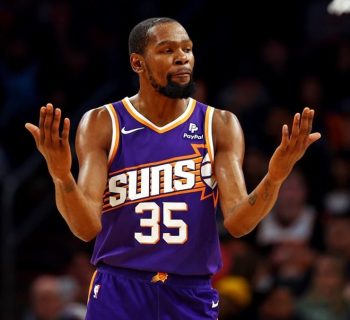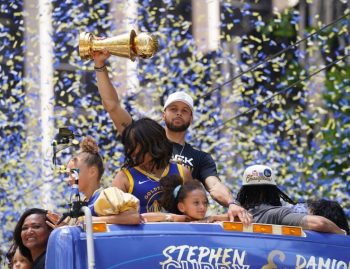NBA
NBA PM: Would Kerr Make A Good Coach?

Steve Kerr on Coaching
With Phil Jackson headed to the New York front office, the next big rumor for the Knicks has involved the potential hiring of Steve Kerr as the new head coach sometime during the offseason. Kerr has been pretty respectful of Mike Woodson and the coaching staff in place by generically commenting that he’d enjoy an opportunity to coach somewhere in the NBA, but didn’t want to talk out of turn about a position that was already currently filled.
“I understand the speculation,” Kerr told Justin Terranova of the New York Post at a NCAA Tournament press conference this week. “I’ve said I wanted to coach at some point in my life, I know Phil, I played for him. People are sort of connecting the dots, but it’s very uncomfortable commenting on speculation, especially when it comes to someone else’s jobs.”
Back in November, however, Kerr, in a conference call to promote the new NBA 2K14 video game, spoke more at length about why he’d like to return to the NBA as a coach rather than an executive, despite the fact that he only has experience doing the latter.
“I have a lot of thoughts about coaching,” Kerr said. “If I get back in, I think it will be on the coaching side. My favorite part of the GM role in terms of my relationships was just dealing with players down on the court. I’d go to practice every day, and I’d let the coaches coach, but just getting to know the players and dealing with them and talking strategy, that really appealed to me. I think if I get back, which I anticipate, it would be on the coaching side.”
Kerr has never coached basketball on any level, but there are former players-turned-coaches in the NBA today seeing some success as first-time coaches, the most notable being Golden State’s Mark Jackson. Jason Kidd has received mixed reviews in Brooklyn, and Vinny Del Negro had a couple of high-profile opportunities in Chicago and L.A. before hanging up his coach’s whistle (for now, at least). In other words, this sort of thing is far from unprecedented.
What Kerr has over those guys is that he’s worked in a position of leadership with an NBA team before. His tenure as GM in Phoenix was definitely mixed, but he saw his fair share of successes. He drafted Goran Dragic, brought in Channing Frye and Grant Hill, and smartly extended Steve Nash when it wasn’t a popular decision to do so.
However, he also was responsible for the failed Shaquille O’Neal trade(s) and tried to force Mike D’Antoni into being a more defense-oriented coach, but his Phoenix teams were far from awful, and there’s a reasonable possibility that his experiences in the front office could translate to a successful job on the sidelines.
“The GM role is really exciting when it comes to player acquisitions,” Kerr said on the 2K Sports conference call. “When you get to acquire a player that you’ve had your eye on—whether you get him in the draft or you make a trade—it’s an electric feeling in that room… It’s accomplishing something, getting a player you really like, and actually seeing it come through on the floor in terms of winning and having success as a team. That’s one thing I do miss as a broadcaster.”
Kerr wouldn’t have that same power with Phil Jackson actually running the team, but he would be able to use the personnel the way he envisioned rather than projecting a philosophy onto another coach and then trying to enforce it from the executive’s chair.
It’s a high-profile job, but Kerr seems more suited than an inexperienced coaching candidate would typically be. He wants in, somehow, somewhere, and Jackson’s new role with the Knicks may allow for it. Of course, Jackson’s consultation in hiring a new coach in Detroit didn’t go so well over the summer, but Mo Cheeks wasn’t his choice alone. Kerr, if hired, would be, and such a risky hire as one of his first moves as Knicks exec could go a long way towards determining Jackson’s legacy in that role—either for good, or for bad.
Pat Croce Spills the Beans on Old Philadelphia Drama
Younger fans of the NBA might not remember former Philadelphia 76ers president Pat Croce, but before there was Mark Cuban, Croce was that animated, outspoken member of a team’s ownership group that cameras just couldn’t get enough of. He was a truly interesting member of the NBA community while he was still a part of it, and apparently very little has changed with him in the decade-and-change since he left the Sixers.
Croce recently spoke with Jared Zwerling of Bleacher Report about some of the discord between Allen Iverson and Larry Brown when the one played for the other back around the turn of the century. At the time (1999-2001), Iverson was among the league’s best players and Brown was among the league’s best coaches, and it was a partnership that would ultimately lead to an NBA Finals appearance for Philadelphia in 2001.
It didn’t all happen organically, though, as there were times that Iverson and Brown were about as volatile a pairing as the NBA has ever seen.
“It was difficult because they were at each other’s throats, and there was the one time when Larry Brown called me and Iverson called me because (Brown) sat him on the bench in Detroit—I wasn’t there—and I got a call that night because I saw that he sat him. And I heard there was a blast on the bus and Larry Brown wanted him traded the next day. And Iverson called me, which was rare, and he wanted him fired,” Croce told Bleacher Report.
“So I said, ‘We’ll meet in the conference room at the practice facility.’ And all the team is waiting outside the glass with the assistant coaches, and inside the room was Larry Brown on one side of the table, Allen Iverson and me on the other side and Billy King toward the end of the table. And I think Tony DiLeo, our scouting director, was also there.
“It was really ugly, like really,” Croce added. “Allen came in ready to kill someone. I’ve never seen him in such a foul mood. He wanted no part with this coach, none. This was my fourth year and (Brown’s) third year. It got really ugly, and I remember saying—to this day, I don’t think Larry Brown likes me because of this, because I made him sit down in this meeting, but it was the catalyst that turned our whole world around—‘You two, I’m not going to trade him, Larry, and I’m not going to fire you. There’s no way.’ I said, ‘You guys don’t understand. You both are so talented, the best of what you do in your business. You’re so headstrong. If you were to look in the mirror, you’d see each other. You both have a common goal; you just go about it in different ways.’”
Croce had to mediate between the two, explaining that Brown didn’t like the sullen vulgarities Iverson would spew every time he was removed from a game, and Iverson didn’t like being told when he could and could not play, despite being a perennial MVP candidate at that point in his career. It was, put bluntly, a bit of a mess.
“Then they started to talk,” Croce said. “And Allen got up, walked all the way around the table and hugged him. I remember it to this day. That was the beginning; that was the real turnaround, I’ll tell you. That year we did real well. We lost to the Indiana Pacers in the second round (in 2000), and then the next year it was a really, really good year, starting off 10-0 and Allen was co-captain. But it was really, really ugly and scary at that time.”
These are the things we wish we could read about as they are happening, but it’s much easier to discuss when the principles are no longer in the league and the franchise faces no negative PR repercussions in the wake of the story.
Still, it’s a fascinating look into a tenuous relationship that did ultimately result in quite a bit of success for both men. Croce was just a member of the ownership group, but he apparently had a big role in keeping the peace. Imagine if Brown or Iverson had been jettisoned in 2000; how different would both men’s legacies be?
We’ll never truly know, but most of us probably don’t want to, anyway.













